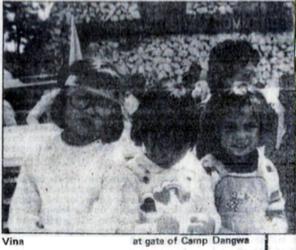Vina Orden
New York
Phillipines 1986
I was seven years old in 1986, but my parents, who had been engaged in the opposition since University, felt it important to take me to the rally in our town (Baguio) to witness living history (the night of 2/22/86, Radio Veritas, our equivalent of Twitter then, helped to organize rallies that spread over the course of the week). The dictatorship affected my family directly, as it did many others. Marcos' declaration of Martial Law and the abolition of the Constitution in 1972 forced law students like my dad to quit their studies as a matter of principle and practice. University opposition groups were regularly infiltrated and dissidents like my dad were jailed. Many of my parents' disillusioned friends who joined the Communist party or militant Hukbalahaps were sought out and never heard from again. My mom was part of the committee that audited the Marcos' vacation estate in Baguio, and the disparity between the poverty of the people and the Marcos' opulence, despite his populist talk, was great (gold 'everyday' dinner utensils, a bedroom that resembled a church altar).
Then, as now, it was decades-worth of pent up anger and frustration that propelled people from all walks of life to revolt. However, the assassination of Ninoy Aquino, exiled oppositionist and challenger to Marcos in the 1986 elections, was the symbolic event that helped his widow, Corazon Aquino to emerge as the clear leader of the opposition. The people coalesced around her, eventually the army defected to the oppositionist camp as well, and became an unstoppable force. Marcos gave in to some unbinding resolutions put forth by the US Congress, such as investigating the Aquino assassination and paving the way for democratic elections, but his stubbornness in holding onto power through rigged snap elections and the continued assassination of oppositionists angered the people even more to the point where his family felt unsafe and they were force to flee the palace. The greatest lesson is that democracy is harder to gain than it is to lose. After Aquino's golden age, restoring the constitution, carrying out economic reforms, and opening up a dialogue with government dissidents (including the Muslim secessionists), we sadly have seen the return of the Marcoses in Filipino politics, and the return of corruption and nepotism/cronyism in the Ramos, Estrada, and Arroyo presidencies.
